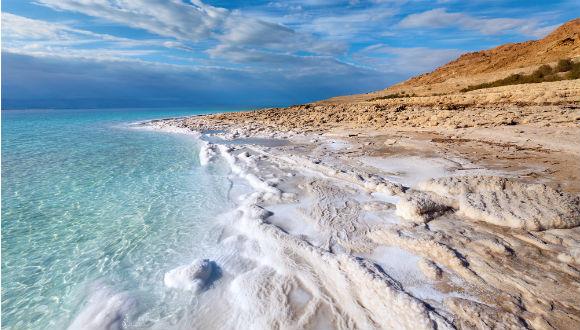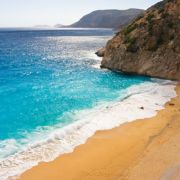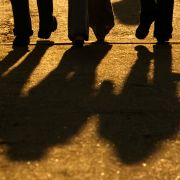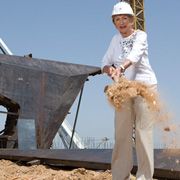Joint Columbia-TAU Expedition Promotes Regional Eco Peace
Solving the environmental problems facing Israel and its Arab neighbors will eventually require a major collaborative effort. This was the overall conclusion of the participants in a unique two-week study tour jointly run by Columbia University’s Earth Institute and TAU’s Porter School of Environmental Studies, entitled “Regional Sustainability in the Middle East.”
In the framework of the program, 14 TAU and Columbia students toured historical and politically-sensitive sites, including East Jerusalem, Amman, the Dead Sea and the Jordan River, with a particular focus on the “Seam Zone” – the area bordered by Israel, Jordan and the Palestinian Authority. The group also attended a two-day international colloquium held on the Tel Aviv University campus.
Between conflict and cooperation
During the course of the tour, participants heard diverse perspectives on cross-border environmental issues from academics, NGO representatives, government officials and activists from Israel, Jordan and the Palestinian Authority. They gained first-hand insight on the ways in which environmental issues span geographic boundaries; how political conflicts create, sustain and escalate such issues; and the role that the environment can play in facilitating cooperation and future peace negotiations.
TAU master’s student Eliav Shtull-Trauring believes that the problems facing the region – such as water shortage, pollution and sewage disposal – are shared ones. “There’s very little cooperation between Israel and the Palestinian Authority on dealing with environmental issues," says Eliav,“but everything that happens in the Palestinian Authority affects us as well. For example, we’re sitting on the same water resources and we have to work together to ensure water quality over the long run.”
Thirsty for water
In Jordan, participants learned that Amman gets fresh water only once a week. In comparison, Israel is much better off. It is now desalinating 50% of its water. “We have the technology and could be helping the Arab world if it were possible,” Eliav says.
The Dead Sea is another cause of concern. For the past 50 years there’s been no water flowing into it from the Jordan River and the water level is going down by one meter a year, notes Eliav. “You just can’t solve this issue without regional cooperation.”
Room for optimism
Despite the hurdles, Eliav says that he and his fellow students remained cautiously optimistic. A joint project is in the works between Israel and Jordan to rebuild the upper part of the lower Jordan River and return the river bed to its historical condition. “If this project succeeds and increases its scope it could include the Palestinians as stakeholders,” he says.
Eliav says the workshop was an eye-opener for both the TAU and Columbia students. “Interacting with the American students was fascinating because they are committed, caring and interested in the world’s complex environmental problems. I believe that it will be up to the younger generation to solve these problems.”
Judging from the feedback from other participants, the tour was a resounding success, and is expected to be the forerunner for further collaboration between the two universities. TAU’s Veronika Lacktman, a graduate student of ecotourism and cross-border environmental issues, summed it up as follows: “The trip was an inspiration. What I learned in a few days was more than I could have hoped to achieve in many hours of work and theoretical studies.” Madeline Silva from Columbia added that “Environmental issues span many academic areas – among them conflict resolution, sustainability management, public health, and international and public affairs – and it was great that the program had people of diverse academic backgrounds working together to reinforce this interdisciplinary breadth.”
Dr. Arie Nesher, Professional Director at the Porter School, says, “the cooperation between TAU and Columbia University’s Earth Institute enabled this unique cross-border experience and introduced students to the environmental consequences of the political situation in the region.”
The tour, jointly organized by the Porter School, the Earth Institute and Columbia’s Middle East Research Center in Amman, Jordan, was led by Columbia’s Dr. Beth Fisher-Yoshida and by TAU doctoral student Shahar Sadeh, a fellow at the Columbia Earth Institute’s Advanced Consortium on Cooperation, Conflict and Complexity.
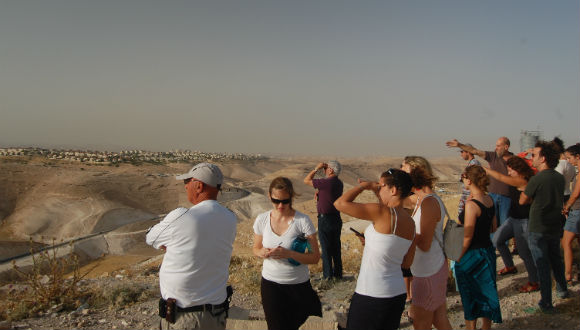
Pictured: Students look out at the Abu-Dis Landfill, located between Jerusalem and Maal'e Adumim
Click here for a short video about the joint project


